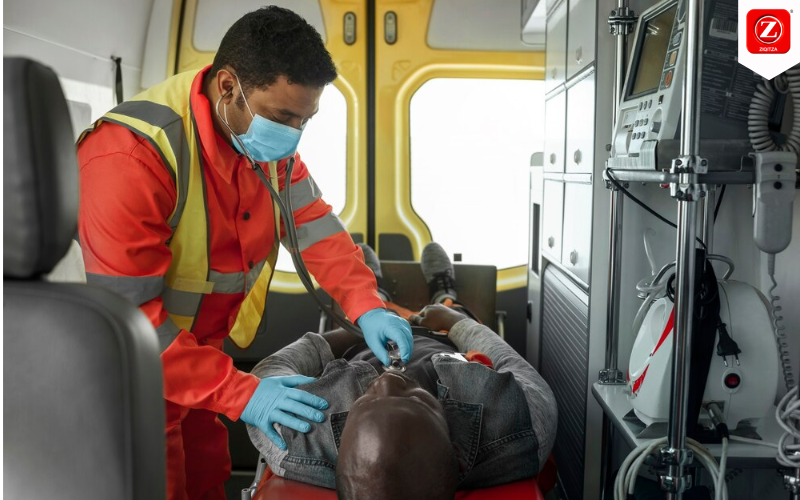In this critical field of emergency medical services (EMS), Ziqitza Health Care Limited leads from the front, providing top-notch ambulance services across various regions. However, the efficiency of their services doesn’t solely rely on equipment or infrastructure; it relies significantly on the preparedness and expertise of their ambulance crews. Simulation training emerges as a pivotal tool in enhancing ambulance education and preparedness, ensuring that Ziqitza‘s teams are equipped to handle any emergency with skill and precision.
Understanding Simulation Training:
Simulation training involves replicating real-life scenarios in a controlled environment to provide practical learning experiences for ambulance crews. It encompasses a range of simulations, from basic life support scenarios to complex, high-pressure situations like mass casualty incidents or cardiac arrests. These simulations can utilize sophisticated mannequins, immersive virtual reality setups, or even live actors to create scenarios that closely mimic real emergencies.
The Benefits of Simulation Training:
Realistic Experience: Simulation training provides ambulance crews with hands-on experience in a safe environment. They can practice procedures, communication skills, and decision-making without the pressure of a real emergency, thereby enhancing their confidence and competence.
Skill Refinement: Ambulance crews can refine and sharpen their clinical skills through repeated practice in simulation scenarios. Whether it’s administering medications, performing CPR, or managing airway obstructions, simulation allows for targeted skill development and feedback.
Team Collaboration: Effective teamwork is crucial in the fast-paced environment of emergency medical services. Simulation training fosters collaboration among team members, allowing them to understand their roles, communicate effectively, and coordinate seamlessly during emergencies.
Error Identification and Correction: Mistakes made during simulation scenarios provide invaluable learning opportunities. Ambulance crews can identify errors, understand their root causes, and implement corrective measures to prevent similar mistakes in real-life situations, ultimately improving patient outcomes.
Adaptability to Diverse Situations: Every emergency is unique, presenting its own challenges and complexities. Simulation training exposes ambulance crews to a wide range of scenarios, including rare or unexpected events, preparing them to adapt quickly and effectively when faced with unfamiliar situations.
Ziqitza’s Commitment to Simulation Training:
Ziqitza Healthcare Ltd. recognizes the critical importance of simulation training in ensuring the readiness of its ambulance crews. By incorporating simulation into their training programs, Ziqitza led by Sweta Mangal demonstrates a commitment to delivering high-quality emergency medical services to communities across various regions. Here’s how Ziqitza Limited leverages simulation training to enhance ambulance education and preparedness:
Tailored Curriculum: Ziqitza Healthcare designs simulation scenarios that align with the specific challenges and needs faced by its ambulance crews in different geographic locations. Whether it’s urban environments with high population density or remote areas with limited resources, Ziqitza’s simulation training addresses diverse scenarios to prepare crews for any situation.
Advanced Facilities: Ziqitza Rajasthan invests in advanced simulation facilities equipped with the latest technology, including immersive virtual reality platforms, and audiovisual recording systems. These facilities provide a realistic training environment that enhances learning and skill acquisition.
Expert Facilitation: Experienced educators and medical professionals lead Ziqitza’s simulation training programs, ensuring that ambulance crews receive expert guidance and feedback. These facilitators debrief crews after each simulation, highlighting areas of strength and areas for improvement, and offering constructive criticism to promote continuous learning.
Continuous Improvement: Sweta Mangal Ziqitza regularly evaluates and updates its simulation training curriculum to incorporate best practices, emerging trends, and feedback from ambulance crews. By embracing a culture of continuous improvement, Ziqitza Limited under Sweta Mangal ensures that its simulation training remains relevant, effective, and aligned with the evolving needs of emergency medical services.
Conclusion:
In the world of emergency medical services, simulation training emerges as a cornerstone of education and preparedness. By providing ambulance crews with realistic experiences, skill refinement opportunities, and enhanced teamwork capabilities, simulation training equips them to deliver high-quality care in the most challenging situations. Ziqitza Healthcare Ltd. exemplifies this commitment to excellence, leveraging simulation training to ensure that its ambulance crews are prepared to respond swiftly, skillfully, and compassionately to any emergency they encounter. Through ongoing investment in simulation training, Ziqitza Healthcare reaffirms its dedication to saving lives and serving communities with unparalleled expertise and professionalism.


